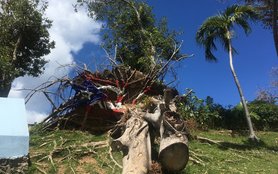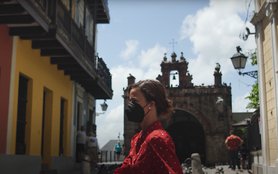Updated July 2020
In 2017, Oxfam took the unusual step of responding to a natural disaster within the United States, when it mounted a program in Puerto Rico. After Hurricane Maria devastated the island, the federal government dragged its feet on delivering emergency aid; nearly three years later, it has still failed to deliver billions in allocated federal recovery dollars.
In late 2019/early 2020, waves of earthquakes and aftershocks rocked the southern region; the still-fragile infrastructure crumbled, leaving hundreds of thousands of people without power or water for days. Thousands of structures (buildings and bridges) were damaged.
And now, the people of Puerto Rico are feeling acute impact from the COVID-19 pandemic. Already suffering the highest poverty rate in the US, unemployment has jumped to 23 percent, food insecurity is rampant, and there is a heightened risk of domestic violence under the lockdown.
Once again, the federal government is failing to respond in a timely and robust manner. Oxfam is working with our network of partners on the ground to extend help to people who are struggling to cope with the physical and psychological effects of the hurricane, the earthquakes, and COVID-19.
Response to earthquakes
This year, Oxfam staff traveled the island, assessing the needs of people and communities. After the earthquakes, Oxfam funded two programs: one to supply tents to people whose houses were damaged (cracked walls and fallen roofs); the other to provide psychological support in five isolated communities where residents are terrified by the prospect of more damage.
Coronavirus response
Oxfam has provided funding to
- Support legal aid (including anti-eviction work)
- Help coordinate and implement a campaign about gender-based violence
- Provide safety clothing, equipment, and housing.
Response to Hurricane Maria: From emergency to building back better
After the hurricane struck, Oxfam focused on working with various local partners in providing emergency help in the form of water filters, solar lights, and legal aid. Today, our focus has shifted away from immediate humanitarian aid and into the recovery phase.
Clean Water
Training on water treatment and testing: Oxfam held workshops to train community leaders on development and application of low-cost methods for water treatment and rapid water testing.
Repair of water systems: The roughly 250 communities that are off the main water system in Puerto Rico are still struggling to repair local aqueducts. Oxfam helped unite a consortium of local organizations to form the Water Alliance, which is restoring water systems in rural and isolated communities, often with solar-powered pumps.
Legal assistance
Through the Foundation for Access to Justice, Oxfam is helping to provide legal aid to families who are still trying to receive emergency funds from the Federal Emergency Management Agency (FEMA). At first, legal aid clinics helped people file claims; now they are helping them appeal rejected claims and prove ownership.
Alternative energy solutions
In coordination with the municipalities and local community leaders, Oxfam increased the safety of women and children by providing 22,271 solar lights to households without power.
Oxfam is supporting Casa Pueblo in Adjuntas in a program to bring solar-powered systems to rural grocery stores in three isolated communities, and to households in need. Casa Pueblo has been a leader in advocating for alternative energy as vital to long-term resilience.
Advocacy in Washington
Oxfam continues advocating on Capitol Hill and with the Administration, fighting for a just recovery for Puerto Rico. We have hosted numerous delegations in Washington, DC, featuring partners and local leaders from Puerto Rico who made their case directly to Members of Congress, Congressional staffers, and high-level FEMA and HUD officials.
We continue to push for more public input in the development of all recovery plans, as all community members should have a voice in how their neighborhoods are being rebuilt and how federal recovery dollars are being spent.
Research on gendered impact of humanitarian disaster
Oxfam led a research project on the gendered impact of lack of water and WASH (water, sanitation, and hygiene) on women in rural Puerto Rico. The resulting report, The Weight of Water on Women, provides a practical set of recommendations for humanitarian response and proposes new lines of work for a gender-sensitive WASH response.
Oxfam also commissioned research for a groundbreaking report, “Women and their voices: Strategies for survival and common strength after hurricanes Irma and María.” The report identifies the gender-specific ways women in Puerto Rico were affected by Hurricanes Irma and María, and the ways they reacted to these catastrophic events.
Donate now to help us meet the most critical needs.











Spread the word
Help us build a global movement for change.